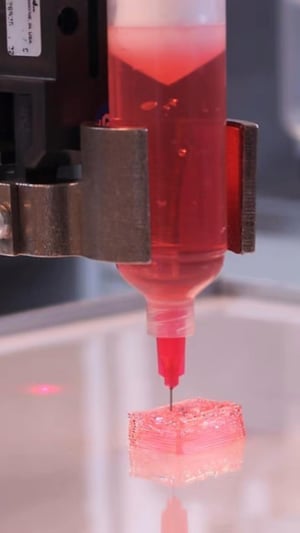Copyright © 2023 RheoSense, Inc.. All rights reserved. Terms and Conditions & Online Privacy
Bioprinting is an emerging technology due to its promise in regenerative medicine and tissue engineering. A bio-ink with desirable rheological properties is required to achieve high printing resolution, shape fidelity and cell viability. Printability, resolution, and cell viability are directly impacted by the viscosity of ink. Therefore, characterizing viscosity over a wide range of shear rates relevant to the printing process is crucial for successful design and development of bio-inks. A printable bio-ink is expected to exhibit shear thinning behavior, which enables the bio-ink to be extruded through a small needle. After deposition, the bio-ink should be able to regain shape fidelity and integrity. Sodium alginate is a non-toxic, biocompatible polymer that has been extensively used as the base material in bioprinting.
In this application note, we show how we use the RheoSense VROC® initium to measure the viscosity of bio-inks at different concentrations and over a wide range of shear rates. We also aim to demonstrate the effect of temperature, pH value, and ionic strength on the viscosity and shear thinning behavior of sodium alginate solutions.
Fill out the short form to the right to download the full Application Note!

Copyright © 2023 RheoSense, Inc.. All rights reserved. Terms and Conditions & Online Privacy